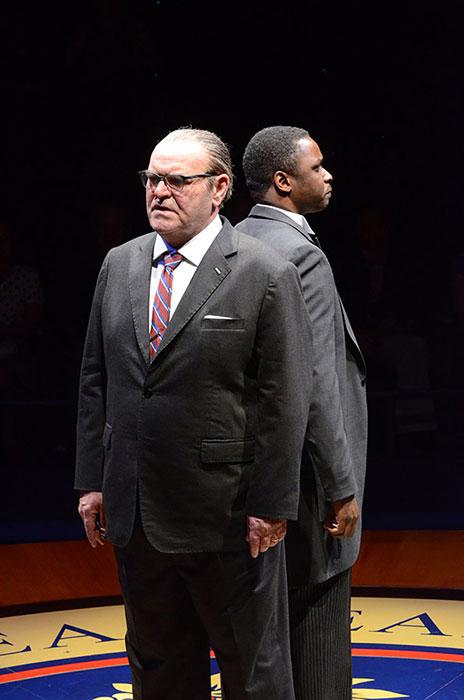A Full and Rich LBJ at Arena Stage
By • April 27, 2016 0 754

The current struggles of the 2016 presidential campaigns — even now, as they steamroll toward the summer conventions unresolved as to who the Democratic and Republican nominees are likely to be — have taken on an apocalyptic tone, as if Trumping and trampling the outsider battles and insider strategies.
Go see “All the Way,” the Broadway hit about Lyndon Baines Johnson and his epic struggle to pass a landmark civil rights bill and get re-elected in 1964 — at Arena Stage through May 8 — and you’ll see that, by comparison, maybe the current contretemps, much of it centered around the candidacy of Donald Trump, aren’t so huge, let alone historic, after all.
And when it comes to vulgarity, the Donald is doing child’s play, or at least middle-school work (something often noted by present-day observers), when compared to the titanic outbursts and style of the Texan LBJ. His references to squeezing the privates of rivals and opponents who stand in his way are numerous and witheringly pungent.
Jack Willis originated the part of LBJ at the Oregon Shakespeare Festival, and Brian Cranston starred in the role on Broadway to much acclaim, but it’s Willis who embodies Johnson, who’s become president after the assassination of John F. Kennedy the year before. Willis doesn’t exactly try to imitate the mannerisms or even the speaking style of LBJ; he does something better: he makes him outsized, not so much physically, but by his sheer, sweaty, loud, hyperventilating and tenacious presence. This LBJ can exhaust the audience, almost as much as he wears down his rivals and friends alike.
Playwright Robert Schenkkan has written and made an epic. It’s nearly three hours long and peopled with just about every notable political and Washington figure alive at the time. It’s the White House that makes LBJ the king of Washington. All the comings and goings — except for those of Martin Luther King Jr., who’s trying to push LBJ while trying to tamp down the more impatient urgings of his close advisors and followers — funnel to and from the White House, interwoven with telephone calls and television clips.
Today’s politicians and presidential wannabes might complain that LBJ was exactly the kind of Washington insider who controlled the game and policy of the times, and it’s true. Historically and on this stage, LBJ is a wheeler-dealer, an arm-twister who made people yelp, a crude, super-smart and physically electric leader. Willis’s Johnson insults his wife, browbeats his vice-president-in-waiting Hubert Humphrey, handles the dangerous and Machiavellian J. Edgar Hoover, manipulates the Southern senators and tries to wrangle the civil rights bill through Congress like a rodeo rider, never giving up, often hanging on for dear life. He compromises, he digs up arcane senate and committee rules, he controls the process. He’s a master psychologist who could use a shrink himself.
The problem with a lengthy play like this is that there’s an amazing amount of historical stuff going on here, and Schenkkan tries to get it all in. That includes the stirrings of the mess and muck of Vietnam, the murder of three civil rights workers in Mississippi, the attempted blackmail by Hoover of just about everybody — but especially King, who’s won the Nobel Peace Prize and is vulnerable in his personal life. We see the beginnings of the South, once securely Democratic, heading towards the GOP.
The second problem is that this could very well be a one-man show (which has been done before) because of the sheer bluster and size, the humanity of Johnson. Nobody quite manages to break through to take over the stage, except Bowman Wright as King when he is arguing with his own group, including his wife, the passionate Stokely Carmichael and the Rev. Ralph Abernathy. This is a reserved, thoughtful, even quiet King, not the famed orator and impassioned leader.
Everyone else is somewhat in the shadows, and perhaps sometimes unfairly portrayed, as is the case for Hubert Humphrey, the Democratic Party’s “Happy Warrior” from Minnesota who, as played by Richard Clodfelter, seems hardly the party’s most optimistic battler for justice as LBJ dangles the vice presidency before him.
Willis gives us a full and rich LBJ, often unpleasant, often, a little like Nixon, insecure and paranoid, but a man who meant to change the nation by sheer force of will, with the help of a memory that knew where the bodies where buried. His belief in bringing justice to African Americans and fairness to the poor came from his own mean beginnings as a Texas schoolteacher, and he embraced this belief with strong arms and tight knuckles. He may have lacked elegance, but he had more than enough heart and vision.

